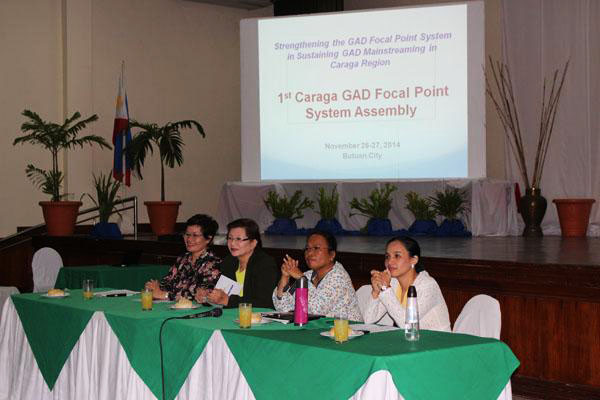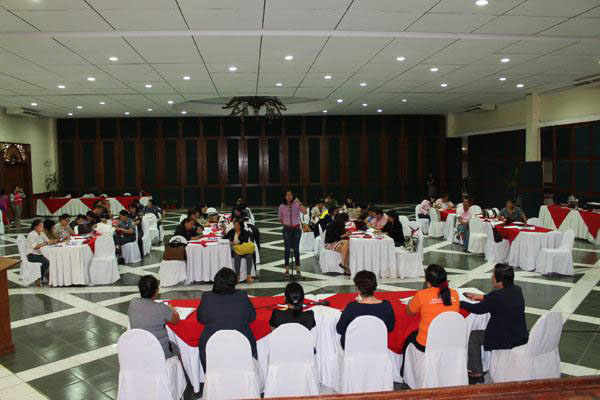Caraga Region strengthens GAD Focal Point Systems

xButuan City, Caraga Region–In partnership with the Philippine Commission on Women, the Regional Development Council-Gender and Development Coordinating Committee (RDC-GADCC), chaired by Atty. Marilyn M. Pintor, spearheaded the first Caraga GAD Focal Point System Assembly last November 26-27, 2014 in Butuan City. The assembly was attended by various regional line agencies, local government units, and government owned and controlled corporations.
The Assembly was graced by the RDC Chair, the Surigao del Norte Governor Sol Matugas. She mentioned that “Caraga Region is among the country’s leading regions to comprehensively perform GAD Planning and Budgeting.”
Session topics were policy imperatives on gender and development, guidelines in the creation of the GAD Focal Point System, introduction to gender analysis, guidelines on GAD Planning & Budgeting and the audit of GAD funds and activities in government agencies. Participants signed an Assembly Declaration, specifying their pledged set of gender mainstreaming actions.
“The gender and development trainings of the PCW-AECID Magna Carta of Women should effect real improvement in the quality of life of all, specifically when participants work together and apply these in gender-responsive governance,” AECID Magna Carta of Women Project Lorena Yunque explained.
Participants shared their current GAD efforts and challenges on Gender Mainstreaming (GM); and identified strategies to respond to these concerns and to sustain GM efforts in Caraga. At the end of the session, participants from Assembly Declaration, specifying their pledged set of gender mainstreaming actions.
Participants were from various regional line agencies, such as the Department of Interior and Local Government, Commission on Audit, Population Commission, Mines and Geosciences Bureau, Department of Public Works and Highways, Department of Environment and Natural Resources, Cooperative Development Authority, Department of Social Welfare and Development, Technical Education and Skills Development Authority, Philippine Information Agency, Commission on Human Rights, Department of Agrarian Reform, Department of Trade and Industry, Philippine National Police, Armed Forces of the Philippines, civil society organizations and government-owned and controlled corporations.
Participating local government units were Agusan del Sur, Agusan del Norte, Surigao del Norte, Surigao del Sur, Dinagat Island, Butuan City, Surigao City, Bislig City and Bayugan City. Participating higher education institutions included the Father SaurninoUrios University, Saint Joseph Institute of Technology and the Caraga State University.
The PCW-AECID MCW Project aims to establish and strengthen local and national convergence of support and services for MCW Implementation through capacity development, technical and funding support to pilot local government units and national government agencies that will craft and implement gender-responsive policies, plans, programs and activities for women’s economic empowerment and women’s social rights.



